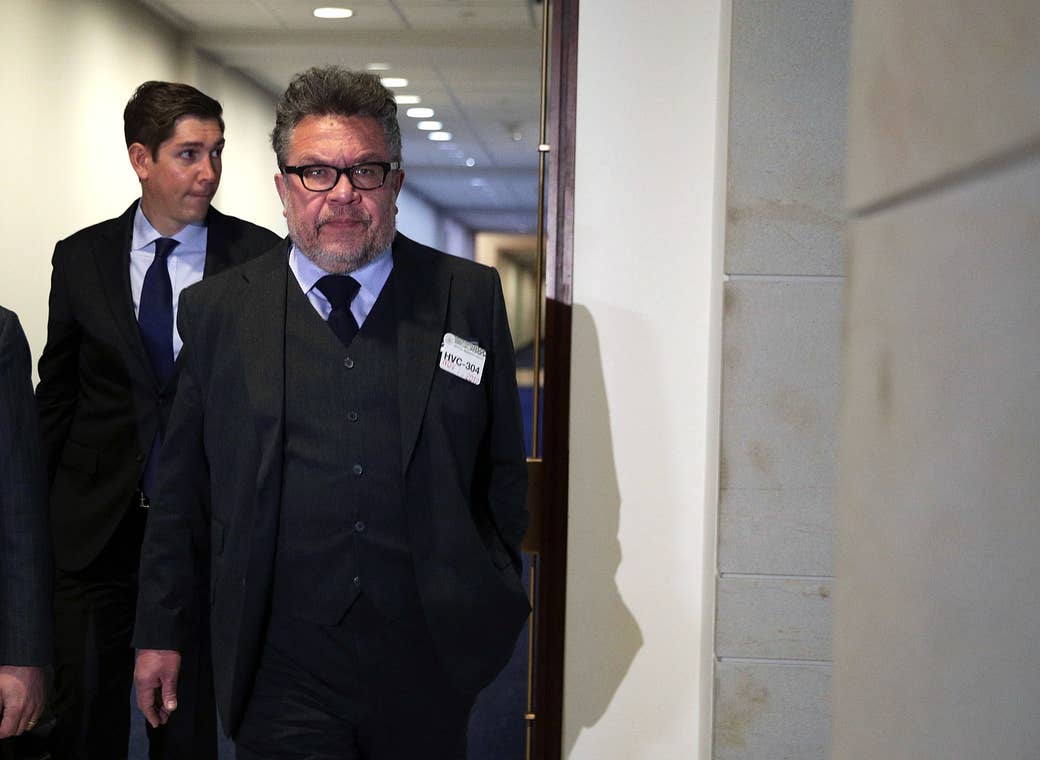
A Russian-born lobbyist who attended the controversial Trump Tower meeting in June 2016 received a series of suspicious payments totaling half a million dollars before and after the encounter.
Documents reviewed by BuzzFeed News show that Rinat Akhmetshin, a Soviet military officer turned Washington lobbyist, deposited large, round-number amounts of cash in the months preceding and following the meeting, where a Russian lawyer offered senior Trump campaign officials dirt on Hillary Clinton.
The lobbyist also received a large payment that bank investigators deemed suspicious from Denis Katsyv, whose company Prevezon Holdings was accused by the US Justice Department of laundering the proceeds of a $230 million Russian tax fraud.
The Trump Tower meeting and those who attended it have become a focus of special counsel Robert Mueller’s inquiry into whether the president’s campaign colluded with Russia to interfere in the 2016 election. As part of that inquiry, banks were asked to pull financial information on the meeting attendees, and investigators at Wells Fargo handed over documents on Akhmetshin to the US Treasury in 2017. Those records were passed to Mueller's team, but Peter Carr, a spokesperson for the special counsel, declined to say whether the transactions are under investigation. Congressional investigators also requested the financial information from the Treasury Department.
Just last month, Natalya Veselnitskaya, the Russian lawyer with whom Akhmetshin attended the meeting, was accused by US authorities of secretly coordinating with the Russian government while defending Katsyv in a money laundering case in New York.
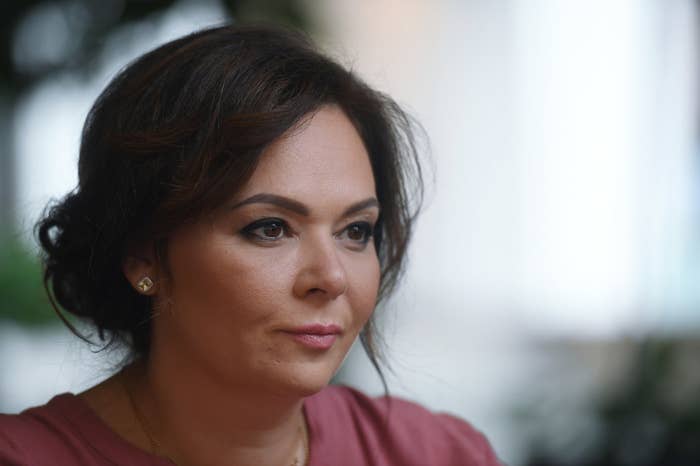
Katsyv, the son of a powerful Russian figure, backed a lobbying campaign by Akhmetshin and Veselnitskaya against the Magnitsky Act, a US law imposing sanctions on a group of Russians officials connected to the suspected $230 million fraud.
In the months before and after the meeting with the Trump campaign, documents show that Akhmetshin made unexplained cash deposits totaling $40,000, and received a wire transfer of $100,000 directly from Katsyv along with $52,000 from a foundation funded by Katsyv and other wealthy Russians to try to undermine that law. Bankers examining the lobbyist’s accounts flagged these transactions for a variety of reasons, including the inability to explain them, their overseas origin, and a suspicion that they showed Akhmetshin had violated federal lobbying law.
A half-million dollars of payments to that nonprofit, the Human Rights Accountability Global Initiative Foundation, have also come under scrutiny. Wired by Katsyv and other backers, the payments came two months before the Trump Tower meeting. Investigators at Bank of America, where the foundation held an account, cited the transactions as potential evidence of corruption and bribery in the bid to overturn the sanctions law, and provided them to Treasury, documents show. Mueller is investigating the foundation, Bloomberg reported.
Bankers at Wells Fargo said the transactions raised concerns that Akhmetshin may have violated the Foreign Agents Registration Act (FARA) by failing to register as a foreign lobbyist for the network of clients whose money flowed his way. That accusation has been echoed by the chair of the Senate Judiciary Committee, who in 2017 requested information on Akhmetshin from the Department of Justice, which enforces FARA. Akhmetshin told the Associated Press that the Justice Department had contacted him in April 2017 telling him he should have registered under FARA.
With a broad mandate to investigate any matters that arise during the Russia inquiry, the special counsel’s office has given that lobbying regulation new bite. Paul Manafort, the president’s former campaign chair, and his partner, Rick Gates, were both charged with violating it and pleaded guilty to charges that encompassed the unregistered foreign lobbying claims.
Beyond his work with Katsyv and Veselnitskaya, investigators discovered that Akhmetshin had received large, mostly unexplained wire transfers from companies in Latvia and Panama, and payments from longtime American political insiders, one of whom is a veteran Republican operator with ties to the Trump campaign.
Akhmetshin and his lawyers did not respond to multiple requests for comment. Reached on his doorstep, the lobbyist told BuzzFeed News, “Get the fuck out of here, okay?”
Veselnitskaya also declined to answer questions. “Don’t bother with questions,” she told BuzzFeed News in Russian. “Your article is paid for and you have your text ready. Don’t be distracted from what you consider the meaning of life.”
Wells Fargo and Bank of America declined to comment. On Tuesday, a spokesperson for the Treasury Department said that it was "working with Congressional committees to respond to their requests" and declined to answer further questions.
The Senate Intelligence Committee, which is leading the congressional probes into Russian election interference, has scrutinized Akhmetshin’s Magnitsky-related lobbying work, chair Richard Burr confirmed to BuzzFeed News. “Given that the June 9 meeting” — in Trump Tower, with senior campaign staff — “was about that, I think we’ve explored every possibility relative to that topic,” Burr said.
Asked if the committee has investigated the nonprofit that backed Akhmetshin’s lobbying efforts, Burr said: “I think everybody’s been of interest to us; every group, every individual that was tied to that.”
In testimony before another Senate committee, Akhmetshin downplayed his role in the Trump Tower meeting, saying he just happened to be in New York City to see a play, and he showed up in a t-shirt and jeans after receiving a last-minute invitation from Veselnitskaya.
But that invitation would thrust him to the center of the Trump-Russia investigation and shine a light on his highly secretive finances.
Want to help us follow the Trump money trail? Join us as a BuzzFeed News member.
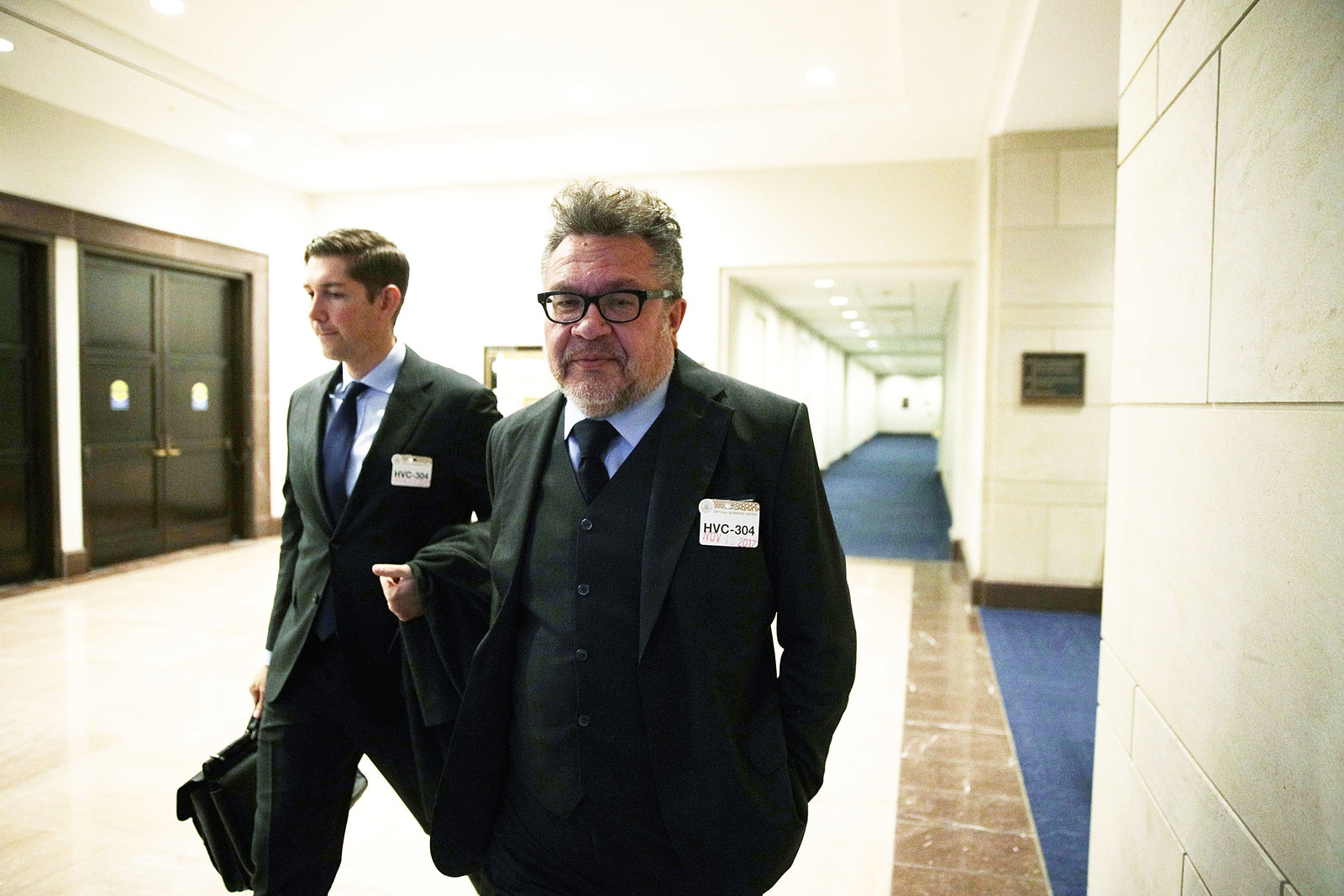
Akhmetshin says it was in late 2015 that he met Denis Katsyv and his lawyer Natalya Veselnitskaya. They wanted his help.
The US government had sued Katsyv’s company, Prevezon Holdings, and accused it of being part of a global money laundering machine. Federal prosecutors said Russian government officials and gangsters had stolen $230 million in a tax refund fraud and used Katsyv to funnel some of it through Manhattan real estate.
Akhmetshin is a well-established Washington power broker who has worked to advance the agendas of Kremlin apparatchiks and influential clients from former Soviet states. When they need someone to bend the ear of a US lawmaker, prod a reporter to write a favorable story, or launch a campaign to discredit their enemies, they turn to Akhmetshin — and pay him handsomely.
So when Prevezon hired a powerful US law firm, Akhmetshin was brought on to review documents, he testified to the Senate Judiciary Committee.
The firm was BakerHostetler, which investigators at Wells Fargo found paid him $97,400 over five months. The payments were flagged along with the others in Akhmetshin’s account as evidence that he might have violated FARA. BakerHostetler did not return a request for comment.
Akhmetshin said an old friend was also working on the case: Ed Lieberman, a Washington attorney with a wealth of experience on matters related to Russia and post-Soviet states. Lieberman and Akhmetshin have known each other for more than two decades, Akhmetshin said, and the duo worked on behalf of organizations connected to a former Kazakh prime minister. Fusion GPS, the Washington research firm that commissioned the famous Trump dossier, was also hired to conduct research.
It was during this time that Katsyv and Veselnitskaya asked Akhmetshin to go a step further. They wanted him to help them change US legislation bearing the Magnitsky name.
The first Magnitsky law, passed in 2012, was named after Sergei Magnitsky, a Russian tax lawyer who was reportedly tortured to death in prison after uncovering the massive fraud. The law placed sanctions on powerful Russians for their involvement in Magnitsky’s death and the vast scheme that Katsyv stood accused of abetting. Now, the US Congress was set to pass a second Magnitsky Act targeting human rights abusers worldwide.
Akhmetshin said he told Katsyv and Veselnitskaya that he had discovered “inconsistencies” in Magnitsky’s story while working on the Prevezon case. “They asked me what was my advice, and as a long-time D.C. resident, I know there’s nothing better like taking these things to the Hill,” Akhmetshin told the Senate Judiciary Committee.
Akhmetshin received his final check from BakerHostetler in March 2016. That same month, he deposited $20,000 cash into his account, the first in a series of cash deposits totaling $78,900 that his bank flagged as suspicious because there was no way to determine their origin or purpose.
In April, Akhmetshin registered to lobby — though not as a foreign agent — on behalf of the Human Rights Accountability Global Initiative Foundation, a Delaware nonprofit that rented office space in the same building as BakerHostetler’s Washington offices. Akhmetshin told congressional investigators the foundation was established by lawyers for Katsyv.
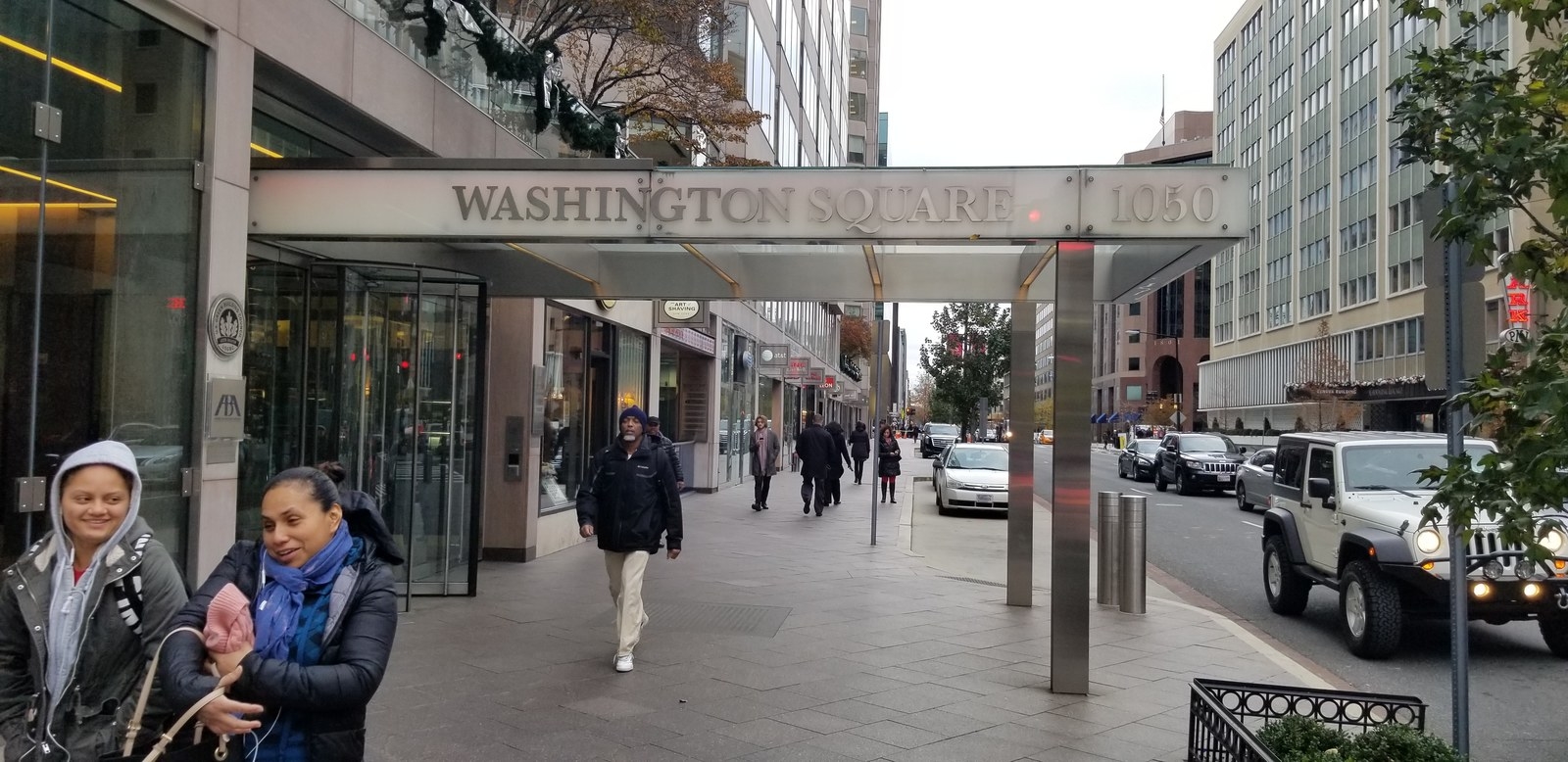
Akhmetshin wrote in his lobbying registration that he would be working on “international adoptions.” That innocent-sounding issue had become a battleground between Russia and the US, with Putin exacting revenge for the sanctions levied under the Magnitsky Act by blocking US adoptions of Russian children. Resuming the adoptions and criticizing the sanctions were among Veselnitskaya’s talking points at the Trump Tower meeting — to the disappointment of Trump campaign officials who had come in search of information about Clinton.
The same month Akhmetshin registered to lobby for the foundation, Katsyv and two of his business partners, plus a Russian bank executive and a company registered in the British Virgin Islands, sent a series of wire transfers totaling nearly $500,000 to the nonprofit’s account.
Examiners at Bank of America later turned a record of these transactions over to US Treasury officials, alerting them that the payments could be evidence of bribery or political corruption related to the Magnitsky Act. The examiners noted it was odd that all five of the deposits happened so close to one another — and not long before the Trump Tower meeting.
At Wells Fargo, officials noted that Akhmetshin received $52,686 from the foundation. The amount is at least $30,000 more than he declared earning on lobbying disclosure forms that year.
Akhmetshin canvassed Capitol Hill, telling lawmakers that the stories they heard about Magnitsky and Russian money-laundering were wrong. The foundation also hired Cozen O’Connor, a high-powered US lobbying firm, and the late Democratic Rep. Ron Dellums. A spokesperson for Cozen O’Connor did not answer questions from BuzzFeed News. "The substance of our brief engagement with HRAGIF is disclosed in our Lobbying Disclosure Act filings," the firm’s spokesperson said. Veselnitskaya says she worked as an advisor to the foundation, while Lieberman came on board as its legal advisor, Akhmetshin said.
Akhmetshin and Dellums spent May 2016 looking for sympathetic members of the House Foreign Affairs Committee, which was working on the new Magnitsky law. “I had a ton of people that the Russians sent through my office to feed me a bunch of bullshit,” Rep. Jim McGovern, a Democrat on the committee who worked on the legislation, told BuzzFeed News.
There was no talk of adoptions when Akhmetshin and Dellums got the attention of Democratic Rep. Gregory Meeks, another member of the committee, outside his office. “This was Magnitsky,” Meeks said.
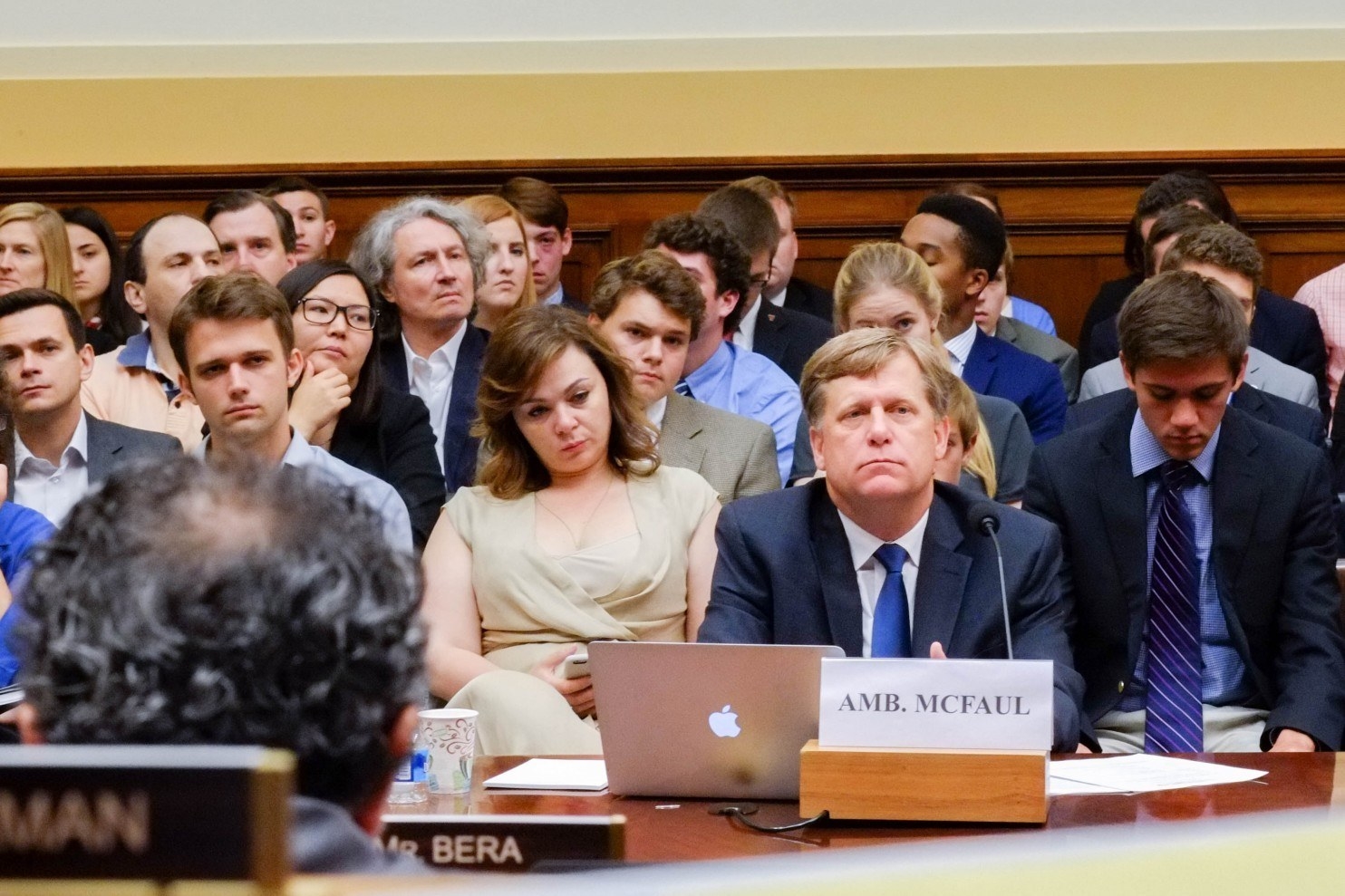
By the early summer, Veselnitskaya was working on a far more audacious approach. The lawyer was busy setting up a meeting in Manhattan with Trump’s top campaign officials, including his son Donald Trump Jr; his son-in-law, Jared Kushner; and his campaign chair Manafort.
Trump Jr. said that when he got to the Trump Tower meeting with the Russians, he quickly realized that Veselnitskaya had little of the promised dirt on Hillary Clinton. “It was clear to me that her real purpose in asking for the meeting all along was to discuss Russian adoptions and the Magnitsky Act,” he told the Senate Judiciary Committee in September 2017. “I proceeded to quickly and politely end the meeting by telling Ms. Veselnitskaya that because my father was a private citizen there did not seem to be any point for having this discussion.”
Akhmetshin made the second large, round-number cash deposit into his account two months later, in August. Bank examiners flagged the $20,000 deposit as suspicious because they could not determine the origin of the funds. The lobbyist also received his final check from the Human Rights Accountability Global Initiative Foundation that month.
Efforts to change the new Magnitsky Act had failed. In December 2016, the US passed the expanded legislation, and a few days later, Akhmetshin filed paperwork saying he was no longer lobbying for the foundation. But payments from those connected to the foundation didn’t stop.
Akhmetshin continued receiving checks and wires from Wiles Consulting, a Florida-based company controlled by Lanny Wiles, a longtime Republican operator. Those payments, which began in January 2016, extended to April 2017, and totaled $72,500.
Investigators at Akhmetshin’s bank said the direction of the payments — from Wiles to Akhmetshin — contrasted with how their working relationship had been portrayed publicly. Investigators, citing unspecified public information, said Wiles claimed he was paid by Akhmetshin to work on the Magnitsky lobbying issue, not the other way around. The investigators did not cite their source, but a 2016 Politico article quoted Wiles saying he had been paid by Akhmetshin. Investigators at Bank of America did find that the foundation had issued checks to Wiles, but the amount is unclear. Wiles, whose wife was the chair of Trump’s Florida campaign, did not return messages seeking comment.
In the same Politico article, Wiles said he didn’t want to register as a foreign agent, but that Akhmetshin had told him it wouldn’t be necessary, as he would be working for BakerHostetler.
FARA offers several exemptions, including one for those representing foreign individuals or entities in a legal capacity. However, the exemption “has several technical requirements and has been interpreted by DOJ relatively narrowly in the past,” said Dan Pickard, a DC lawyer who specializes in FARA. Another exemption allows those representing foreigners to register under the less stringent Lobbying Disclosure Act, as Akhmetshin did. “However, this exemption is not applicable if the agent is working for a foreign principal that is either a government of a foreign country or a foreign political party,” Pickard said.
In August 2017, Akhmetshin made a third cash deposit into his account, this time for $22,900. Again, bank investigators could not readily explain the deposit. That same month, the Financial Times reported, Akhmetshin testified before a grand jury in Mueller’s investigation.
Akhmetshin received another wire transfer in October 2017 — this time directly from Katsyv, whose father, Pyotr Katsyv, is vice president of the state-owned Russian Railways and a former transportation minister. Representatives for Pyotr Katsyv did not return a detailed message.
Pyotr Katsyv was recently revealed to have been involved, at least peripherally, in his son’s US money laundering case. In December 2018, Veselnitskaya was indicted on obstruction of justice charges for allegedly helping the Russian government draft a document claiming that Magnitsky was the true perpetrator of the massive tax fraud. Prevezon, which Veselnitskaya defended, submitted the document in court as evidence. Veselnitskaya emailed drafts of the document to “a supervising Russian prosecutor in the Russian Prosecutor General’s Office,” the indictment says, and in one case copied the “father of the owner of Real Estate Company 1” — identifiable as the senior Katsyv.
The $100,000 from Denis Katsyv to Akhmetshin was listed only as payment for consulting work, the documents show. Given what was already known at the time about Akhmetshin’s work on the Magnitsky Act and Prevezon case, bankers listed the transaction as another example of his alleged undeclared foreign lobbying. Veselnitskaya, who has represented Katsyv, did not answer questions for the Prevezon owner.
Investigators at Wells Fargo reviewed the previous two years of Akhmetshin’s account activity in search of evidence that could be helpful to Mueller’s inquiry. One of the earliest transactions they flagged was a $30,000 wire from a company based in Latvia. Examiners said the transaction referenced a short-term loan, but they could find little information about the company. Bankers labelled the transaction, like other wires into Akhmetshin’s account, as suspicious because it came from overseas and could be connected to Akhmetshin’s alleged undeclared foreign lobbying.
The company was Laudato SIA, a firm connected to Igor Pobereschski, a Russian-German lobbyist. Pobereschski did not answer detailed questions from BuzzFeed News.
A couple months later, in July 2015, a Panamanian shell company called EGH International had wired Akhmetshin $17,774 for what it listed as travel expense reimbursement, examiners found. They could find little other public information about EGH International, either.
Investigators at Wells Fargo noted that beginning in January 2015, Akhmetshin began collecting checks from his old friend Lieberman as well, totaling $52,000 by June 2017. Investigators said one of the checks appeared to reference a rich Russian business owner. Lieberman did not return requests for comment.
Meanwhile, Akhmetshin cashed two checks, worth a total of $7,500, related to another foreign entity — one from an institute he told Congress is “centered around” the former Kazakh prime minister and another from a DC lawyer who has represented him in the US.
Wells Fargo and Bank of America submitted their findings to the Treasury Department in early November 2017. By then, Congress was scrutinizing Akhmetshin, too. The Senate Judiciary and House Intelligence committees questioned Akhmetshin that month. The Senate Intelligence Committee interviewed Akhmetshin in the fall of 2017, a source close to the committee confirmed to BuzzFeed News.
The Senate Intelligence and Judiciary committees both requested financial documents on Akhmetshin, but it’s unclear what, exactly, they have gotten. Burr, the Intelligence Committee chair, has said his panel has received “every financial document” requested from Treasury.
A source familiar with the House Intelligence Committee’s Russia investigation said Akhmetshin’s aggressive Hill lobbying came up during the probe, but was not looked at in great detail. Republicans on the committee shuttered its Russia investigation last year, but Democrats have retaken control of the House, allowing them to reopen the inquiry.
UPDATE
This story has been updated with comment from the Treasury Department.
UPDATE
This story has been updated to remove a reference to a report by another news outlet in accordance with a German court order.




